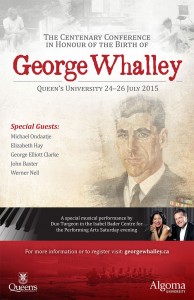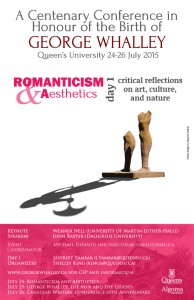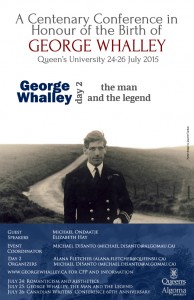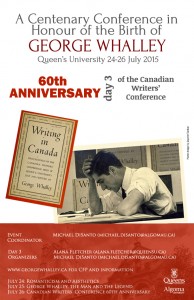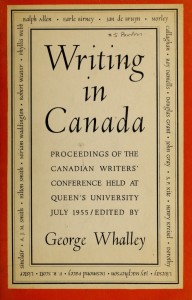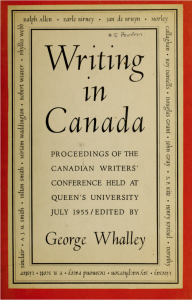Archives
Author Archive
May 29, 2015
Whalley Conference Schedule
The schedule for the conference in honour of George Whalley at Queen’s University, 24-26 July 2015, is now available here. The guest speakers include Michael Ondaatje, Elizabeth Hay, George Elliott Clarke, Werner Nell, and John Baxter. An impressive group of presenters has been assembled, and it includes Dean Irvine, Robert Lecker, Janet Friskney, J.A. Weingarten, and Christopher Doody, among others.
The registration form for the conference is available here.
May 29, 2015
Duo Turgeon Concert – 25 July 2015
As a tribute to George Whalley’s passion for music, Duo Turgeon, the elite piano duo, will perform a concert in the Isabel Bader Centre of Performing Arts on the evening of July 25th at 7:30 pm. Drs. Anne Louise-Turgeon and Edward Turgeon, two members of Algoma U’s Music faculty, have established themselves as one of North America’s prominent piano duos. This event is open to everyone and does not require registration for the conference. Tickets are available to the general public for $25.00. Purchase tickets here.
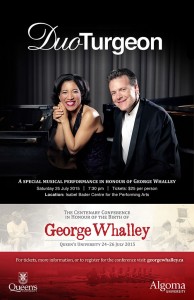
Duo Turgeon will perform in the Isabel Bader Centre on July 25th at 7:30 pm. Tickets are available to the general public for $25.
May 3, 2015
Whalley Conference Update and Posters
Plans are coming along for the conference in honour of George Whalley to be held at Queen’s University, 24-26 July 2015. The schedules for the three days will be available soon. Much of the event will take place in the George Whalley Room in Watson Hall. The Principal of Queen’s U will host a reception on Friday, late in the afternoon. Saturday afternoon, part of the event will take place at the HMCS Cataraqui, in honour of George’s wartime service. On Saturday evening, Duo Turgeon, one of the world’s elite piano duos, will perform in the Isabel Bader Centre. The concert will include pieces by George’s favourite composers. It will be a splendid tribute. Sunday will be a shorter day, with events wrapping up in the early afternoon.
The special guests include Michael Ondaatje, Elizabeth Hay, George Elliot Clarke, John Baxter, and Werner Nell. Also, John Reeves, the CBC producer who worked with Whalley on the adaptation of Primo Levi’s “If This Is A Man” and other works for radio, will be interviewed by Michael Ondaatje.
An exhibition of sculptures by Peter Whalley, George’s brother, will be in the Media Lab in the Isabel Bader Centre. The exhibit will be open 10 to 4 on the 24th and noon to 4 on the 25th and 26th. It will also be open during the Duo Turgeon performance. Queen’s University Archives will have an exhibit of materials from the George Whalley Fonds.
A registration page is now available here.

Concert tickets are included with conference registration. They are available to the general public for $25.
December 17, 2014
George Whalley Project on CTV News
Lincoln Louttit from CTV News Northern Ontario interviewed Robin Isard and me in the Wishart Library at Algoma University. Lincoln produced a short report on the SSHRC Insight Grant we’ve received and the work we’re doing on George Whalley. Two of our research assistants – Sarah Devon and Sam Koshowski – appeared with us. The story was broadcast last night.
September 19, 2014
Whalley Conference site and posters
At the George Whalley website a section is now dedicated to the conference in honour of Whalley to be held at Queen’s University, 24-26 July 2015. An attractive poster for each of the three days has been designed by Jaspreet Tambar, a graduate student at Queen’s University.
The call for papers for the first day is available here.
The call for papers for the second day is available here.
The call for papers for the third day is available here.
The deadline for proposals is 15 January 2015.
September 15, 2014
George Whalley Film Biography
A short film biography of George Whalley is now available here. It has also been published on Youtube here. It is meant to be a concise introduction to Whalley’s life and works.
The film production is by Evan Wainio, an undergraduate film student at York University. He used photographs from the Whalley Estate, Queen’s University Archives, Bishop’s University Archives, Victoria University Library (Toronto), the Imperial War Museum, the German Federal Archives, and the Naval Historical Foundation. Some individuals also provided photos for the film.
The narrator is Brian Brockenshire. I wrote the script.
With some luck, the film will bring to Whalley’s life and writings some renewed attention leading up to the conference in honour of the centenary of his birth to be held at Queen’s University, 24-26 July 2015.
June 20, 2014
Calls for Papers – Conference in Honour of George Whalley, Queen’s University, 24-26 July 2015
A conference in honour of the centenary of the birth of George Whalley will be held at Queen’s University, July 24-26, 2015. Each one of the three days will recognize different aspects of Whalley’s life and work:
Friday, July 24: Romanticism and Aesthetics: Critical reflections on art, culture and nature
Saturday, July 25: George Whalley, the Man and the Legend
Sunday, July 26: The Canadian Writers’ Conference 60th Anniversary
Participants are strongly encouraged to attend all three days of the event, which will include keynote talks, panels, and papers, as well as a reception and a music performance. The organizers are glad to receive academic and non-academic proposals. Members of the Kingston community and Whalley’s family, friends, former colleagues, and students are all welcome to attend.
The proceedings of the conference, including papers, and possibly audio and video recordings, will be edited and published in an open-access edition online.
A conference website will be available in the near future at www.georgewhalley.ca.
The deadline for proposals sent in response to all three calls for papers below is 31 October 2014.
Day 1, July 24—Romanticism and Aesthetics: Critical reflections on art, culture and nature
2015 marks the 100th anniversary of the birth of George Whalley: poet, war hero, and scholar. In recognition of Whalley’s contributions to the study of British Romanticism through his work on Samuel Taylor Coleridge, and his commitment to “aesthetics, the philosophy of art, and the question ‘What does art convey about reality?’” (Annick Hillger), the Department of English at Queen’s University invites you to participate in an interdisciplinary conference on Romanticism and Aesthetics.
In his now archived notes in preparation for the broadcast of his 1955 television special, “An Introduction to Aesthetics,” a part of CBC’s Exploring Minds series, George Whalley wrote:
“Aesthetics, like any other kind of philosophy, is the affectionate search for truth. The Truth it is looking for is the Truth to do with works of art, and to see how the work of artists fits into the structure of reality, where it belongs in the world, what it does for us, and what it does to us.”
This fragment could serve as an epigraph to Whalley’s career and the critical tradition of “aesthetics” that followed. In the spirit of Whalley’s “affectionate search for truth” we ask now, what is art? How ought one to speak of the experience and value of art—including literary art—without, as Whalley feared, “treating works of art as ‘things’” (Poetic Process) of scientific study. Likewise suspicious of the intrusion of the mechanics of scientific study, Coleridge laments of the imaginative consciousness that “We have purchased a few brilliant inventions at the loss of all communion with life and the spirit of nature” (Lay Sermons). How does one then frame the question in inquiring after the truth-claims or the definition of art? What is the manner and purpose of this inquiry, which we call “aesthetics”? What happens at the intersection of art, culture, and nature?
We invite proposals addressing the following possible areas of study:
a) Symbols in Life and Art
b) The Significance of Poetry to the Romantics
c) Beauty as a Criterion for Definition [: Whither Beauty?]
d) Modern Art Criticism and its Romantic Relations
e) The Limits/ Boundaries of Imagination and Genius
f) Why study “Aesthetics”?
Proposals should be no more than 500 words, and include a brief biography of the presenter(s). They can be sent to Jaspreet Tambar (j.tambar@queensu.ca) and Shelley King (kings@queensu.ca).
Day 2, July 25 – George Whalley, the Man and the Legend
George Whalley (1915-83) was an eminent Canadian man of letters: scholar, poet, naval officer and secret intelligence agent during World War II, leading expert on the writings of Samuel Taylor Coleridge, CBC script-writer and broadcaster, musician, biographer, translator, and president of the Kingston symphony. He taught English at Queen’s University (1950-80), and was twice head of the department. He wrote five books, edited or co-edited eleven other books, and published over 120 essays and reviews. Informed by a life intersecting with important historical events and constant intellectual inquiry, Whalley’s remarkable range of work ranks him with other great Canadian thinkers such as George Grant and Northrop Frye. An introduction to Whalley’s life and works can be found at www.georgewhalley.ca.
We invite proposals for both academic and non-academic papers. Possible topics might include (but are not limited to) Whalley’s:
a) criticism, including his Coleridge scholarship and Poetic Process: an essay in poetics (1953)
b) poetry in Poems 1939-1944 (1946), No Man An Island (1948) and The Collected Poems of George Whalley (1986)
c) The Legend of John Hornby (1962) and/or Death in the Barren Ground: The Diary of Edgar Christian (1980)
d) CBC Radio broadcasts
e) translation of Aristotle’s Poetics (1997)
Papers might also focus on:
a) Whalley as educator and mentor
b) his service in the Royal Navy, the Naval Intelligence Division, and the Royal Canadian Navy Volunteer Reserve
c) his influence on writers and scholars
d) his contributions to Queen’s University
e) public intellectualism after Whalley’s example
Proposals will be no more than 500 words, and include a brief biography of the presenter(s). They can be sent to Alana Fletcher (alana.fletcher@queensu.ca) and Michael DiSanto (michael.disanto@algomau.ca).
Day 3, July 26 – The 60th Anniversary of The Canadian Writers’ Conference
From 28-31 July 1955, the Canadian Writers’ Conference was held at Queen’s University. Co-organized by George Whalley, the conference set out to investigate the state of “The Writer, his Media, and the Public” in Canada, bringing together writers and “representatives of the leading publishing professions, literary critics and the mass media, and an audience of interested people from Eastern Canada” (Whalley to John McClelland, 13 July 1955). The conference, which included public evening talks, morning discussion groups, and poetry readings, featured an impressive slate of Canadian writers, including Earle Birney, Desmond Pacey, Eli Mandel, Anne Wilkinson, Dorothy Livesay, Hugh Garner, James Reaney, Jay Macpherson, Phyllis Webb, Adele Wiseman, Ralph Gustafson, Douglas Spettigue, Miriam Waddington, Irving Layton, Frank Scott, Louis Dudek, A.J.M. Smith, and Morley Callaghan.
The issues raised at this conference, from the “lack of genuinely contemporary Canadian poetry in the school texts” in Canada and a need for cheaper editions of Canadian works (Earle Birney, Writing 47-8), to concerns about “literary criticism in Canada today was inadequate … to the public or to the writer” (48) and “the disappearance of the book” itself (John Grey, Writing 53), have echoed throughout Canadian literary history. The New Canadian Library, the Center for Editing Early Canadian Texts, and Editing Modernism in Canada have sought to address the continuing problem of access to Canadian books identified in 1955, while state-of-the-field exercises like the Calgary Conference on the Canadian novel (1978) recalled the 1955 conference’s debates on whether the Canadian novel could be more than a lesser offshoot of the epic tradition (Douglas Grant, Writing 39).
The 1955 Canadian Writers’ Conference, which was presaged by a 1941 Artists’ Conference at Queen’s and followed by the 1956 Conference on British Columbia Literature at UBC, aimed to bring together a community of Canadian writers, critics, publishers, and readers. In this spirit, we invite proposals for papers to be read during a day of sessions that mark the 60th anniversary of the Canadian Writers’ Conference. We welcome papers on topics including (but not limited to):
a) publishing in Canada since 1955, especially Canadian book series
b) the writer’s function in Canada, the writer as celebrity, and the writer/critic
c) Canadian criticism, its promise, and its pitfalls
d) Canadian literature as publicly engaged or academically cloistered
e) funding for writing in Canada
f) the role of conferences, workshops, symposia, colloquia in building a Canadian literary community
g) the “disappearance of the book,” 60 years later
h) reading in Canada: who reads, what’s read, and why?
We encourage academics and non-academics to submit proposals, and we also welcome offers to read poems or other creative writing. Proposals will be no more than 500 words, and include a brief biography of the presenter(s). They can be sent to Alana Fletcher (alana.fletcher@queensu.ca) and Michael DiSanto (michael.disanto@algomau.ca).
April 11, 2014
Conference in Honour of the Centenary of the Birth of George Whalley
Plans are in the works for a three-day conference at Queen’s University to celebrate the centenary of George Whalley’s birth on 25 July 2015. Each one of the three days is meant to stand alone (though some people may wish to attend for two or three days), and the subjects have been chosen to recognize different aspects of Whalley’s life and work.
Friday, July 24 – Romanticism and Aesthetics
Saturday, July 25 – George Whalley, the Man and the Legend
Sunday, July 26 – the 60th Anniversary of the Canadian Writer’s Conference, held at Queen’s University, 28-31 July 1955. (Whalley co-organized the event and edited the conference proceedings, entitled Writing in Canada).
Calls for papers will be made in the near future. The intention is for the sessions on the first and third days to address the topics, not necessarily Whalley and his work. For the second day, there will be papers on at least a few of the following subjects: Whalley’s poetry, his writings on John Hornby and Edgar Christian, his translation of Aristotle’s Poetics, Poetic Process, his love of music, his military career, and his contributions to CBC radio, among other things. Michael Ondaatje and Elizabeth Hay have accepted invitations to speak on the second day.
A banquet in honour of Whalley will be scheduled for Saturday evening and may be held at the HMCS Cataraqui – where Whalley was the commanding officer in the early 1950s – in a room with a beautiful view of the water. The organizers will try to arrange a performance of music from the Romantic period for later Saturday evening in the Bader Centre.
The conference is not meant to be narrowly academic. Family, friends, former colleagues and students, as well as people in the Kingston community are all welcome to attend.
Questions and suggestions are welcome: email me at michael.disanto@algomau.ca.
March 6, 2014
Whalley Resartus
Thanks to Robin Isard, the eSystems Librarian at Algoma University, the Whalley website has a sharp new suit: http://georgewhalley.ca. Robin updated the site to Drupal 7 while making some significant upgrades to the database that sits behind the public side of the project.
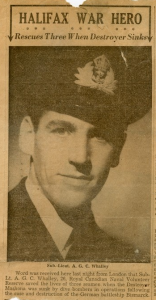
Taken from a newspaper clipping in the George Whalley Fonds in Queen’s University Archives. The full image is on the home page of the new website.
A conference honouring Whalley on the weekend of 25 July 2015 – that date being the centenary of his birth – is in the works. It will be hosted by Queen’s University, his academic home from 1950 to 1980.
The plan for the last day of the weekend is to revisit the Canadian Writers’ Conference, which was held at Queen’s University from the 25th to the 28th of July, 1955. It is fitting to celebrate Whalley’s centenary and the sixtieth anniversary of the writers’ conference together because Whalley was one of the organizers and edited the proceedings, Writing in Canada (1956). The list of those in attendance reads like a who’s who of Canadian writers of the period: A.J.M. Smith, F.R. Scott, Morley Callaghan, Phyllis Webb, Miriam Waddington, and Dorothy Livesay, among many others.
More news will follow soon, I hope.
September 4, 2013
“A More Platonic James Bond”
Over the past few months, some wonderful recordings of George Whalley have come to light. When I visited with his daughter Katharine in June, I discovered two cassette tapes that she had been given 30 years ago. The recordings had survived and the audio is excellent. In the last two months, Jen Hardwick, a PhD candidate in English at Queen’s University, has been making digital copies of recordings on reel-to-reel tapes that Whalley once owned and donated to the Queen’s University Archives. On many of these the sound quality is excellent. Several of the recordings have been edited and added to the website: http://georgewhalley.algomau.ca/drupal6/node/76.
There is a fascinating autobiographical fragment that Whalley recorded on March 21, 1977. The reflections on his childhood and the lively conversations he heard at home are remarkable.
Long before Elizabeth Hay wrote Late Nights On Air – a novel deeply rooted in Whalley’s The Legend of John Hornby and his radio drama Death in the Barren Ground – and received the Giller prize, she lived in Yellowknife and was friends with Katharine. In April 1976 Whalley visited Yellowknife, having been there a few years back to after driving a VW Beetle from Edmonton for his daughter and her husband. Elizabeth interviewed Whalley about Hornby, a book she read years before and admired very much.
On February 23, 1967, F.R. Scott gave a poetry reading in the Agnes Etherington Art Centre at Queen’s University. Whalley made the introduction that evening. They had known each other for many years: they co-organized the Writing in Canada conference at Queen’s University in July 1955 and Scott contributed an essay to A Place of Liberty, a collected of essays on university governance that Whalley edited. Whalley’s introduction is unlike any other Scott was given, I suspect: http://georgewhalley.algomau.ca/drupal6/node/1885.
The selection of readings of Whalley’s poems, taken from two tapes recorded about a decade apart, allows us to hear the pieces differently than we will when reading them for ourselves.The laughter raised by “A Minor Poet is Visited by the Muse” is well worth hearing: http://georgewhalley.algomau.ca/drupal6/node/1781. The reading of “Pig” resonates for me: http://georgewhalley.algomau.ca/drupal6/node/1786. I saw the pig in Southwold (it made the trip back to England many years before).
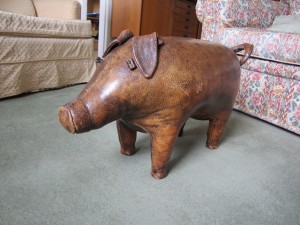
The pig, purchased at Herrods, that travelled under Whalley’s arm from London in “defiance of all airline and government regulations.”
Doug Jones and Whalley gave a joint reading at the Agnes Etherington Art Centre on March 10, 1966. Jones introduces Whalley as “a more platonic James Bond,” which raises great laughter from the audience. What was the expression on Whalley’s face at that moment? And how many in the audience had any sense of the truth behind the remark, any knowledge of Whalley’s secret intelligence work for the Royal Navy in World War II?
Whalley much admired the poetry of Donne, Hopkins, and Yeats. Of Yeats, Whalley wrote “He has been my greatest despair & encouragement” in a 1945 letter to Arnold Banfill. Whalley’s deep attachment to the writers can be heard in his readings of Donne’s “The Relic,” Hopkins’ “The Windhover,” Yeats “The Second Coming,” and the others published here. Listening to Whalley read the poems, as if he can effortlessly voice the styles and the rhythms, makes me realize how difficult it is to read poetry well.
The website will be slowly updated and revised over the next several months. In the meantime, it is worthwhile to draw attention to the recordings now published.
